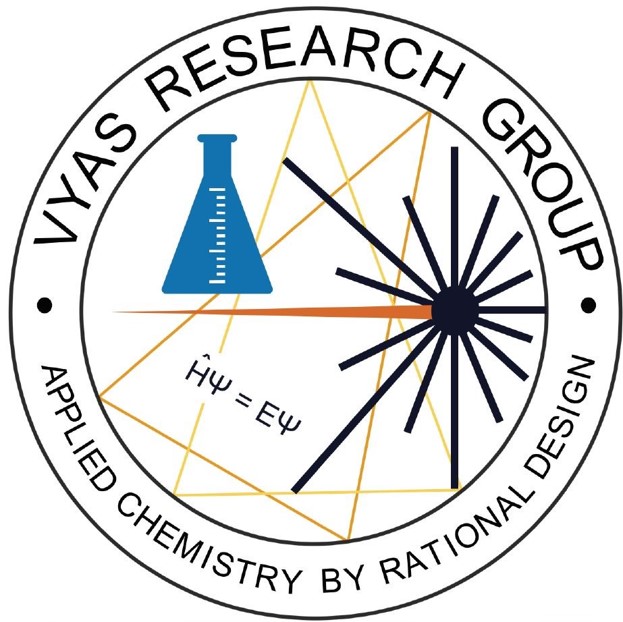The research vision of The Vyas Research Group (VRG) is to utilize both chemical computations and targeted experimentations to understand the chemical processes/systems, and rationally design novel processes/systems or improve upon the existing processes/systems. Prof. Vyas developed this research philosophy during his doctoral work where he rationally designed chemical and biological systems to break down organophosphorus chemical warfare agents, tuned photochemical reactions and designed first organic molecular to split water. Due to the interdisciplinary nature of the group, there are many projects that the VRG leads and many others are collaborative in nature. Current research efforts are funded through National Science Foundation, Department of Energy and NREL.
If you need specific information about a project or research effort, please contact Prof. Vyas.
If you want to get involved with the Vyas Research Group, we are always looking for talented students and researchers. Feel free to send an email to Prof. Vyas.

Remediation of Perfluoalkyl Substances
Perfluoroalkyl substances (PFASs) are one of the most recalcitrant anthropogenic environmental pollutants of concern. Due to their hydrophobic and oleophobic properties, they are widely utilized in several applications such as coating agents and aqueous fire fighting foams. However, their pervasive use has now contaminated the biosphere significantly. Our research efforts are directed towards developing a fundamental understanding of properties of various classes of PFASs, and their interactions and reactivity to other chemicals in turn with one goal in mind, remediation of PFASs. Current research work is focused on 1) investigating the fundamental properties of PFASs, 2) outlining the oxidative and reductive mechanistic pathways and possible reaction pathways to various products, 3) obtaining the kinetics of oxidation and reduction of PFASs. We utilize computational chemistry, laser spectroscopy and chemical synthesis tools for this project. This effort is funded by two NSF grants, CHE-1710079 and CHE-1807739.
Remediating Heavy Elements Waste
Spent nuclear fuel contains many different fission products that have different degrees of radioactivity. Investigating the properties of these elements such as americium and curium is of utmost importance in order to devise better protocols for managing the radioactive waste. In this regard, our group is investigating the fundamental properties of lanthanide and actinide complexes in both organic and aquoues phases. Since liquid-liquid extraction is one of the approaches to separate the lanthanides from actinides, our group also attempts to probe the kinetic barriers involved in such separation. We utilize molecular dynamics simulations and quantum chemical calculations along with time-resolved laser induced fluorescence for this project. This effort is currently funded by Nuclear Energy University Program (NEUP) in collaboration with Prof. Mark P. Jensen and Argonne National Laboratory.
Tuning Nanoparticle Catalysts via Carbon Supports
Properties of nanoparticle catalysts such as stability and reactivity can be altered by modifying the carbon supports. These catalysts are utilized for several alternate energy applications and transformation of chemical contaminants. Our group utilize quantum chemical and density functional theory calculations to understand which precious and non-precious transition metal catalysts can be stabilized over which types of doped carbon supports, and how do their electronic structure and reactivity can be tuned. This project is in collaboration with Prof. Svitlana Pylypenko and is supported by CHE-1800585.
Altering the Mechanisms Involved in Polymerization
Coming up soon!! CHE-1807863